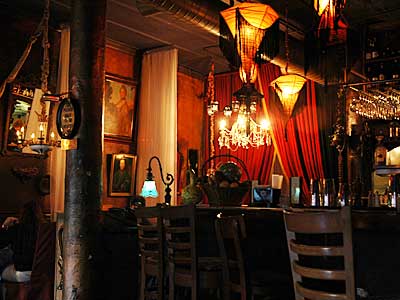
Just had Sunday brunch at Bleu evolution, the Washington Heights staple whose decor, according to Zagat's, is somewhere in between bordello and Mad-Hatter tea party-- as this picture only begins to demonstrate (and for the lushes amongst, us, prix fixe brunch avec coffee, OJ AND bloody mary or mimosa is only 12.95). The staff had amped up the decor times ten by hanging cobwebs and skeletons from every protruding object--of which there are many. Creepy and delightful--and the blueberry pancakes were yum.
It was the perfect setting for a literaryish discussion of last night's film adventure--Marie Antoinette at the Village East. Halfway through the movie, I turned to my companion in glee and said "I love this movie!" It had everything a romantic feminist could want, from gorgeous tableus to an expose of the patriarchal and bizarre court customs (Marie is essentially sold, after all, to France, for the sake of an alliance). We see the pressure their society puts on the Dauphine and Dauphin, who are as we know a very young teenage couple, to produce an heir-- and we realize that they don't really understand the mechanics of sex. We see maneuvering by and snubbing of the King's flamboyant mistress, who is cast away when he's on his deathbed, lest his last confession be negated by her presence. We see an endless set of tired, stilted rituals that at first cow Marie, and she soon learns to manipulate to her own advantage. It's a fucked up, fucked up world, and the approach of the revolution beats like a steady drumbeat only in our consciousness-- but it's there because we can't not think of it. So far, so good, Sofia Copola.

But after Marie becomes queen and Louis (Jason Schawtzman, who redeems the entire movie with his performance) finally figures out how to fit his key into Marie's lock, something goes terribly awry. The movie lapses into a series of montages of Marie popping champagne, lying, half-hungover on various settees and carpets, squealing with delight over more and more diverting and costly amusements, and swooning over a Count who literally does not speak at all during their affair. While Copola makes a half-hearted attempt to symbolize the oncoming revolution, it feels tacked on and empty. We're bored and frustrated with the camera's endless lingering on Kirsten Dunst's pretty, but not THAT exciting, mug. By the end, I wanted her to head to the guillotine out of sheer frustration with not only her shallowness, but the shallowness of her portrayal.
All the relevant commentary that could be made--about decadence, emptiness, social manipulation, the gap between rich and poor, the relationship between Marie and Louis, and the place of women at court-- suddenly devolved into a ode to pretty things. It was such a disappointing ending after the quick, clever and promising start. But the movie is definitely worth seeing because of the gorgeous costumes, the fun music, and the shots of Versailles ,which make a prettier picture the ole' gilded cage actually is these days (or at least what one can see of it behind the mob of tourists and schoolgroups and money being sucked away from them for lackluster tours).
Vive la Revolution!





Awkward sex and stifling social rituals? Sounds a lot like Ho'Mann!
ReplyDeleteyuk yuk yuk yuk yuk
j/k! u r awesomeee